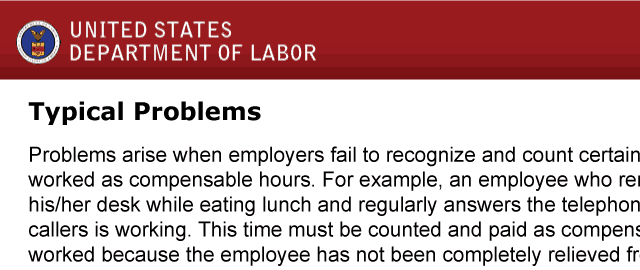Picture this scene if you will:
You're at home, enjoying a nice leisurely weekend with your family and friends after a hard week at work. Suddenly, your peaceful day is interrupted by a call or email from your employer who requires the latest version of your last report immediately and would like to discuss it with you right now. You, as a loyal employee, are suddenly caught between a rock and a hard place – to fight for your free time or do as you're requested in order to remain in good standing. It's an uncomfortable and sometimes infuriating situation that many of us have been faced with at one time or another. Of course, with any role comes a certain amount of expected responsibility, but where does one draw the line?
As companies grow, expand and evolve, resources can become over-tapped and roles often become increasingly more demanding in every department. For employees, it can be a delicate balancing act to try and keep up with what's expected in order to maintain a high caliber of work. It can also burn employees out and ultimately, turn them against their managers and the company.
Now, it's fair to say that there will always be situations, times of year, perhaps high demand projects that will require more time and effort from everyone in order to meet deadlines. Often in these situations, companies that are well managed and create positive environments can thrive, as employees learn that during these times everyone works hardest together as a team. When these periods arise, take the time to remind your team that everyone's contribution is valued and that this high demand on their effort and energy is for an abbreviated amount of time only. Adequate, standard financial compensation is always appreciated, but going above and beyond to recognize the efforts of your staff will pay off when the next time crunch arises.
Depending on your opinion (and everyone has one), I think it'd be a fair assumption that most employees value their time off just as much as they value the money they make. When dealing with contract negotiation, often the benefits and vacation time are of higher consequence to individuals and sometimes what they fight harder for. What does that tell us? Well, it's pretty clear that people value their time away from work just as much as they do the money they get to take home.
Helping your employees achieve a healthy work-life balance is not just good morals, but it's your obligation as an employer. Without this in place, you run the risk of overworked, jaded and unhappy employees who are not just operating at lower emotional levels, but whose performance is likely suffering as well. Additionally, those loyal, hard-working staff who've helped build your company or project and gotten little in return are now seeking employment elsewhere. And you've become the bad guy.
Lady Gaga recently found herself in legal hot water when her former assistant filed a complaint against her citing unfair work expectations and unpaid overtime. Selecting a friend for the position (and offering her a healthy salary) was just not enough to compensate for the fact that she received absolutely no relief from the job. To be available 24 hours a day, 7 days a week was the expectation and though she agreed to it, it's just not legal.

Labor laws, like Canada's Federal Labour Standards and the Department of Labor's The Fair Labor Standards Act (FLSA) are in place to guide employers in making sure that they adhere to fair practices for all employees, regardless of the tasks required or the salary paid. It's one thing to ask an employee to go above and beyond in a role, but it's another thing entirely to break the law. If you choose to ignore the standards, you risk legal action and what's sometimes worse, a ruined reputation as a dependable and trusting employer. As Lady Gaga may learn, the effects of this could be infinitely worse than what you would lose if you chose to compensate your employees fairly in both time and money from the beginning.
So how can you make a difference? Recognize that you're employees are not just staff; they're people who have needs, who have lives and who are trying to do their best in all areas of their life. Take responsibility for the legal obligation you have to them with regards to time, compensation and expectations. It's more than just compliance with the law; it's an integral part of who you are as an employer and as a company.










